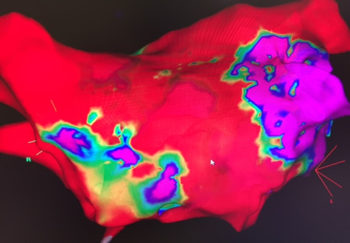
Holly Roach didn’t always know she wanted to be a nurse. In fact, she began her career working in finance. After ten years of investments and portfolio allocation, she felt something was missing. Both of her nephews were neonatal intensive care unit (NICU) babies, and their experience helped inspire Roach to start nursing school in 2010.
She began her nursing career in pediatrics and transitioned into the cardiac catheterization lab. She’s now assistant nurse manager in the electrophysiology (EP) lab. In this role, Roach oversees the day-to-day operations of the lab, supervises the nursing staff and helps manage the patient schedule.
Typical Electrophysiology Patients
Electrophysiology has to do with the electrical activity within the heart. The EP lab sees patients who need treatment for abnormal electrical activity. According to Roach, the UVA EP lab receives lots of referrals from other hospitals’ EP departments, because they don’t have the same range of services. It’s not uncommon for patients to travel several hours to see the specialists at UVA.
Common EP Treatments
Some EP patients have abnormal heart rhythms, or arrhythmias. Each patient’s treatment depends on the type of arrhythmia and its cause.
Device Implantation
Sometimes, treatment involves implanting a device such as a pacemaker or a defibrillator. Devices like these monitor for and correct dangerous arrhythmias.
Rhythm Ablations for Arrhythmias
Other times, a patient with an arrhythmia such as ventricular tachycardia (also called VT or v-tach) or atrial fibrillation (also called AF or afib) may need a rhythm ablation. In this procedure, the EP team uses electrodes to determine the source of abnormal electrical activity and destroy the unnecessary pathways.
Pacemaker Maintenance and Removal
The EP lab also does generator replacement for patients whose pacemakers are due for a new battery as well as extraction for patients whose pacemakers need to be removed.
Cutting Edge Heart Treatments
There are two new pieces of technology Roach is particularly excited about:
- A 252-electrode disposable mapping vest, called CardioInsight, which allows the care team to create 3D cardiac maps of patients noninvasively. This is done pre-procedure and helps guide the doctor during the procedure.
- A leadless pacemaker, called Micra, which is inserted into the right ventricle by a needle puncture through the skin, rather than by surgical incision, and doesn’t have the leads (wires that deliver electrical current to the heart) of a traditional pacemaker.
Electrophysiology Research at UVA
The EP lab is also involved in clinical research. Roach says there is a trial in progress that aims to reduce the risk of stroke. The study is comparing two different options for left atrial appendage closure. This part of the heart is a primary source of blood clot formation for afib patients, and closing this area off reduces the risk of stroke.
Learn More about Abnormal Heart Rhythms
Check out the rhythm disorders UVA can treat.
The Best Part of Working at UVA
According to Roach, the best parts about working at UVA are:
- The focus on collaboration
- The commitment to being the safest place to work
- Rewarding interactions with her staff and patients
“Working in a procedural unit, we see sick patients come in, and we can often fix their issues. They go through the procedure to have their device inserted, and then we get to see them go home, able to get back to their lives. It’s rewarding to see that the team’s work can help them,” Roach explains.
Advice for Future Electrophysiology Nurses
As someone who started her career outside of healthcare, Roach offers a unique perspective to prospective nurses. “I think nursing is a wonderful career,” she says. “You get the opportunity to care for others when they need it most. There’s an incredible amount of flexibility and variability in nursing. You can always try something new if it interests you. Many careers do not and cannot provide that. The EP lab is an area where you can learn something new and continue to grow and learn throughout your career.”


How do you obtain this position and training if no recent cardiac ward/ unit experience?